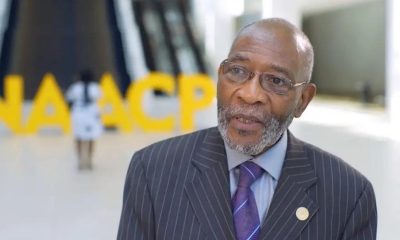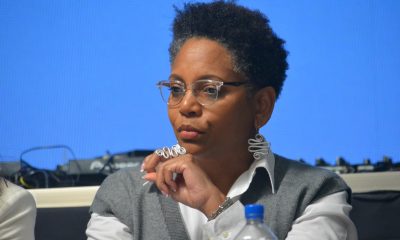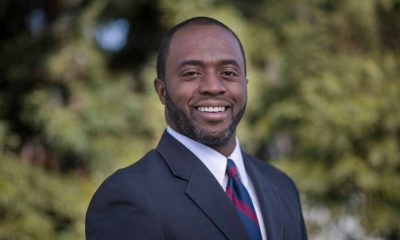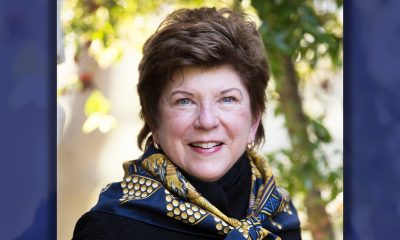Activism
Through Ads and Advocates, Battle Over Calif. Gambling Propositions Heat Up
A statewide survey by the Public Policy Institute of California (PPIC), conducted between Sept. 2 and 11 and released on Sept. 15, revealed that 54% of California voters would vote “no” for Prop 27, while 34% would vote “yes.” Twelve percent of the respondents were “unsure.” The survey’s authors wrote that a strong majority of Republicans wouldn’t vote for the proposition, compared to half of Democrats and independents.

By McKenzie Jackson | California Black Media
Clint Thompson, a Santa Monica resident in his 30s, wouldn’t say he has been inundated with advertisements supporting or denigrating Propositions 26 and 27, but he sees an ad focused on one of the legislations each time he turns on his television.
“I usually watch the news during the day — NBC — and on NBC, Prop 26 or Prop 27 comes on every other commercial break per show,” said Thompson, an actor, who admitted he hasn’t researched the sports gambling propositions. “Both of the props seem to have good things with them. The commercials seem to have reasons why you should say ‘yes,’ or ‘no.’”
Prop 26 would legalize roulette, dice games, and sports betting on Native American tribal lands if approved by voters in the Nov. 8 election. It is backed by over 50 state Native American tribes.
Prop 27, supported by sportsbooks DraftKings, FanDuel, BetMGM, Fanatics, PENN Entertainment, and WynnBet, would give those sports betting companies the reins in sports gambling in the Golden State and allow online gambling.
If people like Thompson feel the advertisements from the campaigns for and against the propositions seem to be flooding the television and radio airwaves — and to be ever-present on social media (Watched a YouTube video lately?) — they might be right.
The dueling propositions have raised a combined $400 million for advertising leading up to Election Day this November. That has led to ads backing and slamming the two propositions to be front and center in all forms of media Californians consume.
Dinah Bachrach of the Racial Justice Allies of Sonoma County, a group supporting Prop 26, said the proliferation of ads supporting Prop 27 is concerning.
“They are all over the place,” Bachrach said. “Gambling is already a pretty big business, but to be able to do sports gambling online is dangerous because it hurts what tribal casinos have been able to do for their communities in the state.”
According to Bachrach, Prop 26 protects the sovereignty of native tribes. “It’s a really important racial justice issue,” she said. “Indian casinos provide a tremendous amount of financial support for the casino tribes and the non-casino tribes, and they contribute a lot locally and to the state.”
Bachrach’s organization is one of several civil rights or African American organizations that have thrown its support behind Prop 26.
Santa Clarita NAACP spokesperson Nati Braunstein said in an email, “The NAACP supports Prop 26, which would legalize retail sports betting at California tribal casinos only and opposes Prop 27 which would allow online sports betting via mobile sportsbooks.”
Kathy Fairbanks, speaking for the Yes on 26/No on 27 coalition, composed of California Indian tribes and tribal organizations, and other partners, said winning the approval of every potential voter, including Black Californians, is their goal.
Yes on 27 – Californians for Solutions to Homelessness, the campaign arm of Prop 27 backers, had not returned California Black Media’s requests for comment for this story as of press time. Prop 27 proponents say in ads and the Yes on 27 website repeats that the initiative would help solve California’s homelessness crisis.
Prop 27 imposes a 10% tax on adjusted gross gaming revenue. Eighty-five percent of the taxes go toward fighting California’s homeless and mental health challenges. Non-gaming tribes get the remaining 15% of tax revenue.
Organizations such as Bay Area Community Services, Sacramento Regional Coalition to End Homelessness, San Diego Regional Task Force on Homelessness, and individuals including Long Beach Mayor Robert Garcia, Oakland Mayor Libby Schaaf, Bay Area Community Services CEO Jamie Almanza, and Middletown Rancheria of Pomo Indians Chairman Jose “Moke” Simon are listed as Prop 27 supporters on the Yes on 27 website.
On the campaign’s Facebook page, commenter Brandon Gran wrote under an advertisement photo that voting for Prop 27 was a “no brainer.”
“People are already gambling using offshore accounts,” he typed. “Why not allow CA to get a piece of the pie … money that will (hopefully) go to good use.”
However, a statewide survey by the Public Policy Institute of California (PPIC), conducted between Sept. 2 and 11 and released on Sept. 15, revealed that 54% of California voters would vote “no” for Prop 27, while 34% would vote “yes.” Twelve percent of the respondents were “unsure.”
The survey’s authors wrote that a strong majority of Republicans wouldn’t vote for the proposition, compared to half of Democrats and independents.
“Regionally, majorities in the Inland Empire, Orange/San Diego, and the San Francisco Bay Area would vote ‘no,’ while likely voters in the Central Valley and Los Angeles are divided,” they wrote. “At least half across most demographic groups would vote ‘no.’ Likely voters age 18 to 44 (52%) and renters (51%) are the only two demographic groups with a slim majority voting ‘yes.’”
The survey, titled “PPIC Statewide Survey: Californians and Their Government,” did not ask participants about Prop 26. The Yes on 26/No on 27 coalition, said in a news release that the PPIC’s research confirmed what Prop 26 supporters have said for some time.
“Despite raising more than $160 million for a deceptive advertising campaign, California voters are clearly not buying what the out-of-state online gambling corporations behind Prop 27 are selling,” the statement read.
Activism
S.F. Black Leaders Rally to Protest, Discuss ‘Epidemic’ of Racial Slurs Against Black Students in SF Public School System
Parents at the meeting spoke of their children as no longer feeling safe in school because of bullying and discrimination. Parents also said that reported incidents such as racial slurs and intimidation are not dealt with to their satisfaction and feel ignored.

By Carla Thomas
San Francisco’s Third Baptist Church hosted a rally and meeting Sunday to discuss hatred toward African American students of the San Francisco Unified School District (SFUSD).
Rev. Amos C. Brown, president of the San Francisco NAACP and pastor of Third Baptist Church, along with leadership from local civil rights groups, the city’s faith-based community and Black community leadership convened at the church.
“There has been an epidemic of racial slurs and mistreatment of Black children in our public schools in the city,” said Brown. “This will not be tolerated.”
According to civil rights advocate Mattie Scott, students from elementary to high school have reported an extraordinary amount of racial slurs directed at them.
“There is a surge of overt racism in the schools, and our children should not be subjected to this,” said Scott. “Students are in school to learn, develop, and grow, not be hated on,” said Scott. “The parents of the children feel they have not received the support necessary to protect their children.”
Attendees were briefed last Friday in a meeting with SFUSD Superintendent Dr. Matt Wayne.
SFUSD states that their policies protect children and they are not at liberty to publicly discuss the issues to protect the children’s privacy.
Parents at the meeting spoke of their children as no longer feeling safe in school because of bullying and discrimination. Parents also said that reported incidents such as racial slurs and intimidation are not dealt with to their satisfaction and feel ignored.
Some parents said they have removed their students from school while other parents and community leaders called on the removal of the SFUSD superintendent, the firing of certain school principals and the need for more supportive school board members.
Community advocates discussed boycotting the schools and creating Freedom Schools led by Black leaders and educators, reassuring parents that their child’s wellbeing and education are the highest priority and youth are not to be disrupted by racism or policies that don’t support them.
Virginia Marshall, chair of the San Francisco NAACP’s education committee, offered encouragement to the parents and students in attendance while also announcing an upcoming May 14 school board meeting to demand accountability over their mistreatment.
“I’m urging anyone that cares about our students to pack the May 14 school board meeting,” said Marshall.
This resource was supported in whole or in part by funding provided by the State of California, administered by the California State Library via California Black Media as part of the Stop the Hate Program. The program is supported by partnership with California Department of Social Services and the California Commission on Asian and Pacific Islander American Affairs as part of the Stop the Hate program. To report a hate incident or hate crime and get support, go to CA vs Hate.
Activism
Oakland Ambassadors Strengthen Ties and Aid Efforts in Ghana
Oakland natives and esteemed members of the African American Sports and Entertainment Group (AASEG), Jonathan P. Jones and Dr. Maritony Efua Jones, recently embarked on a significant journey to Ghana as guests of the World Martial Authority Ghana. This trip signifies a crucial opportunity to bolster partnerships, explore new avenues of collaboration, and contribute to impactful initiatives in Ghana.
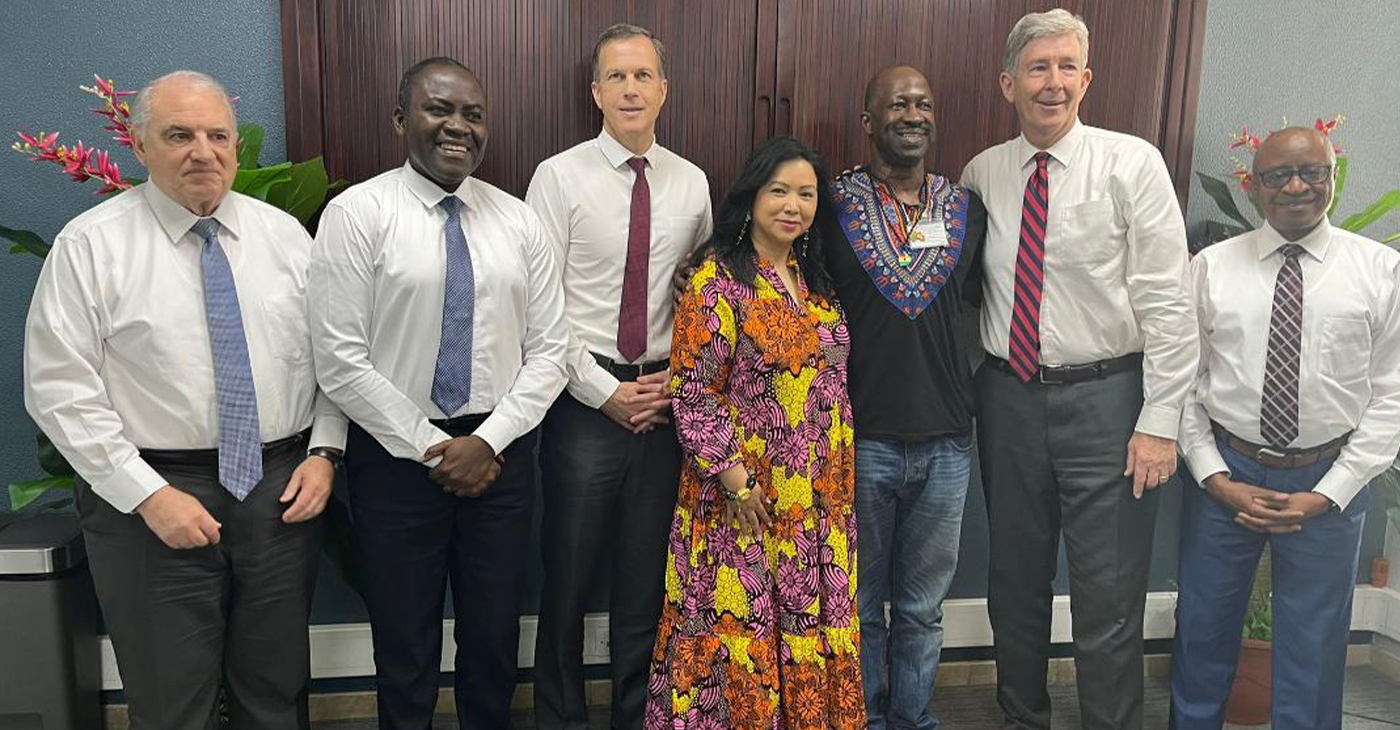
By Post Staff
Oakland natives and esteemed members of the African American Sports and Entertainment Group (AASEG), Jonathan P. Jones and Dr. Maritony Efua Jones, recently embarked on a significant journey to Ghana as guests of the World Martial Authority Ghana.
This trip signifies a crucial opportunity to bolster partnerships, explore new avenues of collaboration, and contribute to impactful initiatives in Ghana.
Upon their arrival at Katota Airport in Accra, Ghana, the Joneses were warmly received by His Royal Majesty Okatakyie Asafo Boakye III, the distinguished king of Sanzule Kingdom in the Eastern Nzema, and Etse Nyamedi of World Martial Authority, Ghana.
Nyamedi accompanied the Joneses to the city of Mepe, which had recently experienced flooding, to assess damages and engage with local leaders, elders, and youth regarding the city’s urgent needs after major floods last fall.
Key concerns and priorities identified by the community include comprehensive flood mitigation measures, agricultural support, housing initiatives, educational enhancements, improved healthcare access, and the development of communal recreational spaces.
The Joneses were also graciously invited to meet with leaders of The Church of Jesus Christ of Latter-day Saints at their headquarters in Accra. This meeting provided insights into ongoing humanitarian efforts in Ghana and explored avenues for collaboration to further assist Ghanaian communities.
The LDS leaders shared their prompt response to the recent flood, demonstrating their commitment to humanitarian aid by dispatching substantial supplies including medical provisions, sanitation items, blankets, and food to assist flood victims just four days after the disaster.
Additionally, Boakye extended a special invitation to the Joneses to his palace, where they were pleasantly surprised with a heartfelt recognition ceremony. Maritony Jones was honored as the Queen Mother of the Sanzule Kingdom in acknowledgment of her dedicated work, while Jonathan Jones was lauded and welcomed as the ambassador of the Sanzule Kingdom, symbolizing a meaningful homecoming to their ancestral land.
The visit not only strengthens ties between Oakland and Ghana but also underscores the collaborative spirit and commitment to meaningful progress and humanitarian endeavors shared by all involved parties.
Activism
Calif. Anti-Sex Trafficking Advocates Discuss Competing Bills, Strategies
Advocates from across California are challenging state officials and community leaders to support legislation that provides resources and services for survivors and victims of human trafficking, as well as assistance as they transition back into civil society. Some of those advocates are also calling for more effective state policy to curtail trafficking, a crime that has an outsized impact on Black children, particularly girls.
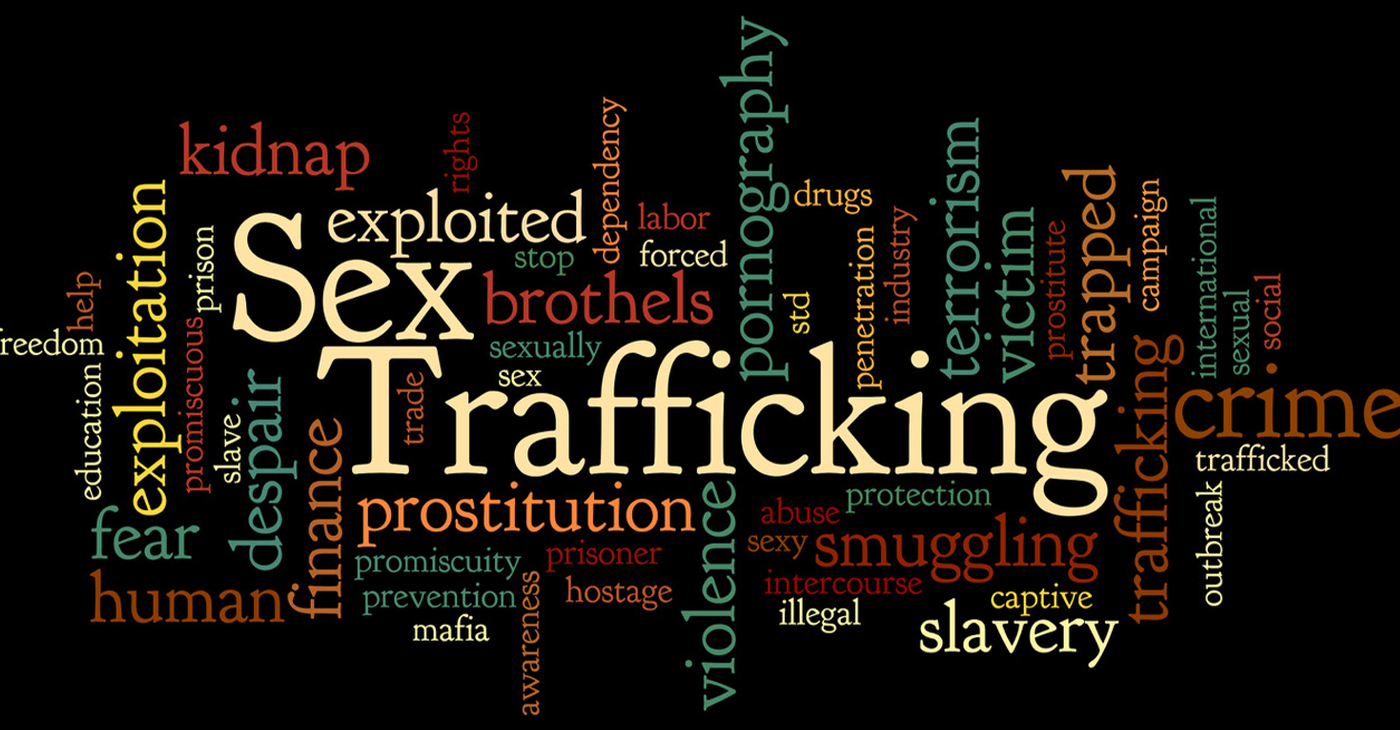
By Bo Tefu, California Black Media
Advocates from across California are challenging state officials and community leaders to support legislation that provides resources and services for survivors and victims of human trafficking, as well as assistance as they transition back into civil society.
Some of those advocates are also calling for more effective state policy to curtail trafficking, a crime that has an outsized impact on Black children, particularly girls.
According to the FBI, a report covering a two-year period found Black children accounted for 57% of all juvenile arrests for prostitution. In addition, 40% of sex trafficking victims were Black and 60% of those victims had been enrolled in the foster care system.
“It is time to hold the perpetrators who take advantage of our children accountable,” said the Rev. Shane Harris, a San Diego-based activist, former foster youth and founder of the Peoples Association of Justice Advocates, (PAJA), a national civil rights organization and policy think tank.
“It is time to send a thorough message that if you seek to buy a child for sex, you will pay the highest criminal penalties in this state,” added Harris who was speaking at a rally at the State Capitol earlier this month. Harris was speaking in support of Senate Bill 1414, authored by Sen. Shannon Grove (D-Bakersfield), which calls for people who buy sex from minors to be punished with a felony. The punishment includes a two-year prison sentence and a $25,000 fine.
Harris said the PAJA is the only civil rights organization in the state that supports SB 1414.
Harris urged other Black-led groups who favor anti-trafficking legislation more focused on criminal justice reforms (as opposed to stiffer penalties), to “join the movement.”
Many of those civil rights groups fear that SB 1414 could lead to the incarceration of more Black youth.
Those sentiments were echoed in a panel discussion organized by Black women advocates on April 26 to examine the cause and effects of human trafficking in California’s Black communities. The virtual event was hosted by the Forgotten Children, Inc, a faith-based nonprofit that advocates for survivors and victims of human trafficking through anti-trafficking campaigns and initiatives.
Panelists shared the psychological impact of sexual exploitation on youth and children in the long term.
Author and educator Dr. Stephany Powell shared statistics and information revealing that African American women and girls are the most trafficked nationwide.
Powell, who serves as the senior advisor on law enforcement and policy at the National Center on Sexual Exploitation said that national data indicates that sex trade survivors are disproportionately women of color. She stated that male survivors often go unnoticed because boys rarely report trafficked crimes.
Powell said that decriminalizing prostitution in California could increase human trafficking. She argued that Senate Bill 357, authored by Sen. Scott Wiener (D-San Francisco), which was signed into law in 2022 and legalized loitering for prostitution, caused a surge in street-level prostitution.
Panelist and psychologist Dr. Gloria Morrow shared opposing views on decriminalizing prostitution. She said that decriminalizing prostitution could help survivors gain access to state resources and support.
Despite opposing views, Powell and Morrow agree that the Black community needs resources and educational programs to address human trafficking.
-

 Community3 weeks ago
Community3 weeks agoFinancial Assistance Bill for Descendants of Enslaved Persons to Help Them Purchase, Own, or Maintain a Home
-

 Business3 weeks ago
Business3 weeks agoV.P. Kamala Harris: Americans With Criminal Records Will Soon Be Eligible for SBA Loans
-

 Activism4 weeks ago
Activism4 weeks agoOakland Post: Week of April 10 – 16, 2024
-

 Community3 weeks ago
Community3 weeks agoAG Bonta Says Oakland School Leaders Should Comply with State Laws to Avoid ‘Disparate Harm’ When Closing or Merging Schools
-

 Activism2 weeks ago
Activism2 weeks agoOakland Post: Week of April 24 – 30, 2024
-

 City Government3 days ago
City Government3 days agoCourt Throws Out Law That Allowed Californians to Build Duplexes, Triplexes and RDUs on Their Properties
-

 Community2 weeks ago
Community2 weeks agoRichmond Nonprofit Helps Ex-Felons Get Back on Their Feet
-

 Community2 weeks ago
Community2 weeks agoOakland WNBA Player to be Inducted Into Hall of Fame

